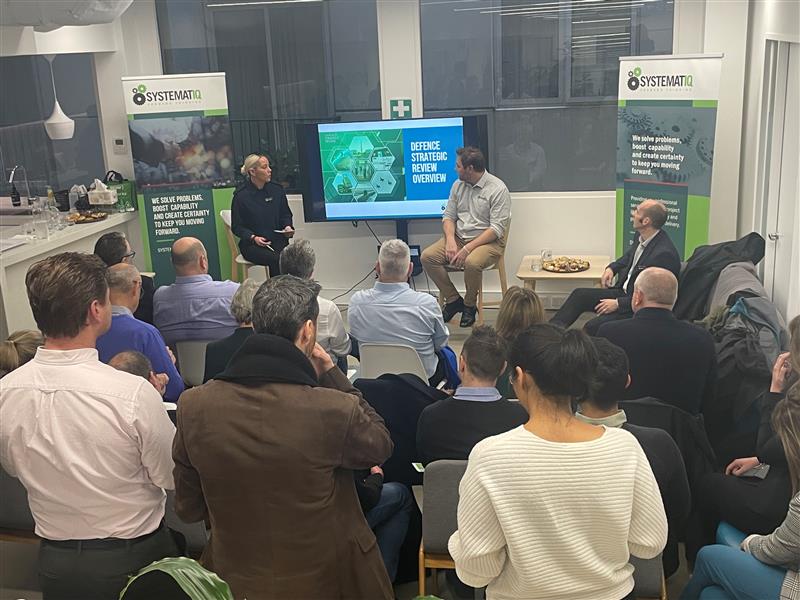On the 23rd of June, defence consulting firm Systematiq hosted a breakfast networking event and panel discussion, sponsored by the Australian Industry and Defence Network (AIDN), to discuss the recently released Defence Strategic Review and the opportunities it presents for Australian defence Industry.
Attended by key decision makers representing government, consulting firms, Australian primes, and SMEs, the event proved to be a productive forum for industry representatives to share their insight regarding our collective response to the DSR.
Multiple topics were touched on across the discussion, with key themes resurfacing throughout; such as SME and supply chain positioning, the importance of AIC, and collaboration between industry and government to expediate capability acquisition.
However, these themes were connected by a key idea: that Australian defence industry needs to be proactive and put the onus on ourselves to get our messaging out to the Commonwealth.
Business Development Manager of EOS Defence Systems Mark Dixon commented on the nature and importance of this messaging.
‘We have solutions on shore that cover what the DSR is looking for, so it’s up to us to inform the ADF what is available locally.’
;We need to remember the lessons learned from the Covid supply chain crisis,’ he continues, ‘and remain focused on getting our message out that we can not only deliver the capability locally, but also provide ongoing support.’
For defence SMEs looking to capitalize on new opportunities following the release of the DSR, this message rings truer than ever.
On the topic of SME positioning, Systematiq’s Director of Projects and Strategy Brydon Johnson provides his insight.
‘A good thing that came out of the DSR is that defence is looking to make it easy to deal with us [Australian industry], especially in terms of small enterprises.’
‘Defence as an entity is slow to change, so industry has plenty of time to pivot in order to pursue new opportunities.’
‘We need to think about what we can control,’ he adds, ‘and what we can put out as messaging to the government.’
‘It’s about setting yourself up for success, by possessing the right ingredients to have the right capability at the right time.’
The sovereign nature of local Australian SMEs is also a key driver for the Commonwealth to do business with them, as conversation shifted to the value of Australian Industry Content (AIC), and sovereign capabilities.
Although certain sections of the DSR have suggested that the Commonwealth is seeking to reduce their emphasis on AIC, many within the industry are confident that the value of AIC will remain vital to Australia’s defensive capabilities.
Andrew Garth, Managing Director at Defence Industry Advisory Services (DIAS), offers his view on the importance of Australia’s sovereign capability.
‘With the presence of real threat to Australia’s trade routes and international supply chain, there will always remain a necessity for sovereign capability.’
“At the end of the day, the Commonwealth still needs Australian industry in the defence of the country”.
“As such,’ he continues, ‘regardless of its “absence” in the DSR, AIC will continue to remain a key feature of the Defence industry development strategy.”
He continues by emphasising that the Commonwealth’s need for AIC should also be an essential part of the messaging industry must relay to Defence.
‘Industry needs to make the government aware that having Australian industry capability on shore is valuable to them.’
‘The Commonwealth haven’t changed the procurement rules around Australian Industry Content and the government will continue to need a strong Defence industry to support defence sustainment.’
Mark Dixon echoes this sentiment:
‘We need to continue to push the sovereign capability line; not just in delivering the capability, but also providing ongoing sustainment support.’
As an ex-senior Project Management director within CASG, Systematiq’s Director of Project Management Ben Burrows also maintains that AIC will remain a key discriminator for Australian defence businesses.
‘It’s important, now more than ever, to use AIC more strategically and smartly.’
‘There’s remains a massive opportunity,’ he adds, ‘for industry helping defence achieve value for money.’
In order to strengthen AIC and provide SMEs with these opportunities, collaboration between Defence and industry is essential.
A representative from the Victorian Government outlines how this network of collaboration could be solidified in the near future, through the help of organisations like AIDN and supply chain partners Systematiq.
‘Through AIDN connections, we’re seeking to get the right people in defence in the same room as industry, and especially defence SMEs.’
‘We try to get people with a military focus—HLCs, HLSs—to convey messages to SMEs at critical junctures.’
‘When policy drops, someone from government will come down and brief industry on what that means.’
Through these programs and initiatives, lines of communication between government and industry will be strengthened; providing support to Australian businesses, addressing DSR directives, and ultimately reinforcing Australia’s defensive capabilities.
AIDN President Adam Evans spoke on the importance of organizations like AIDN and Systematiq in facilitating this conversation.
‘AIDN’s goal is to help shape policy in order to define what is good and bad for Australian industry, and to be a voice for the Australian defence SME community.’
Open conversation and discourse lies at the heart of collaboration. To build a robust and resourceful network of collaboration, functions such as the Systematiq networking event are invaluable.
These events strengthen ties between representatives all across the Australian defence sector, and provide a forum for discussion that not only offers expert insight for those seeking it, but also allows the entire community to leverage a wealth of collective knowledge, procured from centuries of combined experience in the defence industry.
Systematiq would like to thank AIDN for sponsoring the event, and look forward to further opportunities to host defence networking functions in the future.






